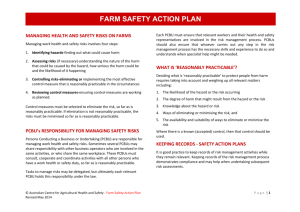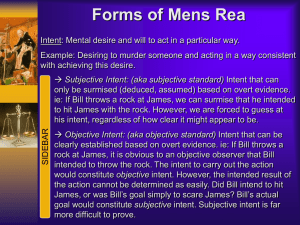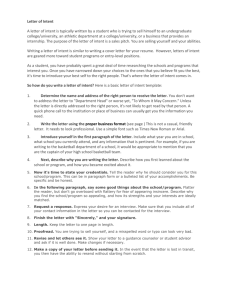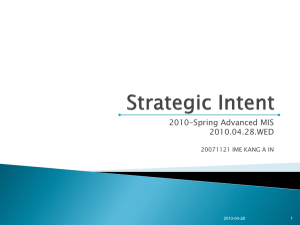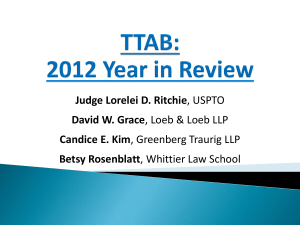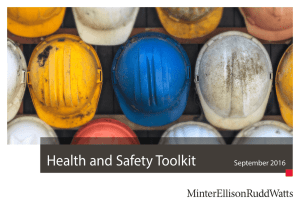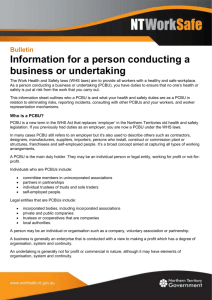See the Health and Safety Workforce Reform Bill at a glance
advertisement
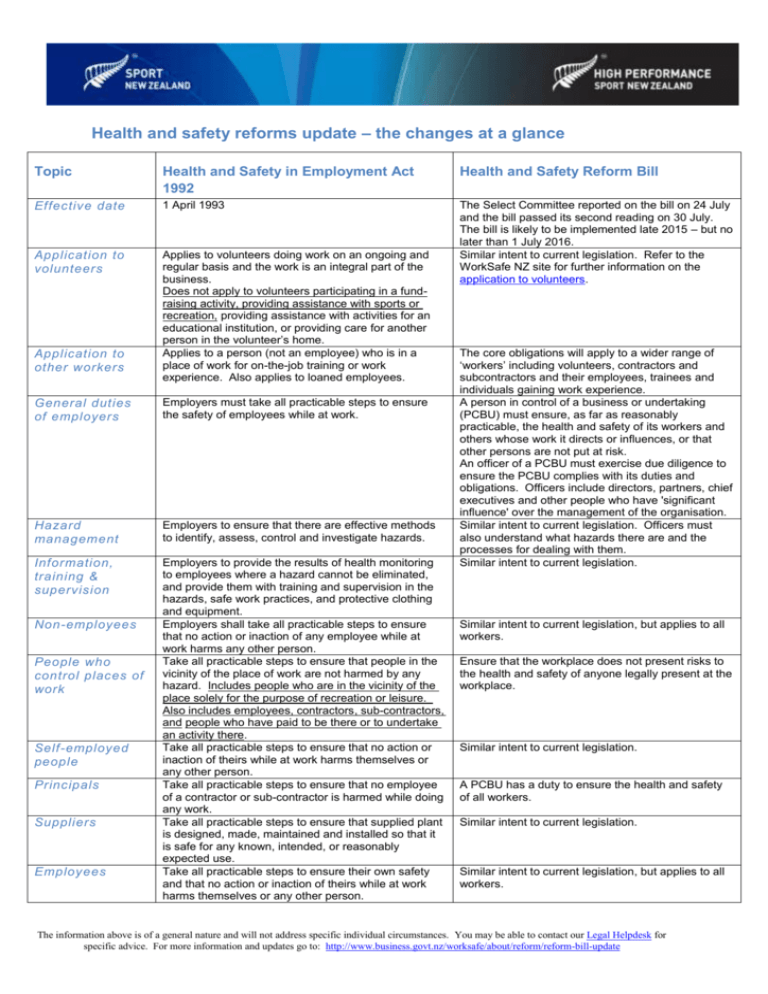
Health and safety reforms update – the changes at a glance Topic Health and Safety in Employment Act 1992 Health and Safety Reform Bill Effective date 1 April 1993 Application to volunteers Applies to volunteers doing work on an ongoing and regular basis and the work is an integral part of the business. Does not apply to volunteers participating in a fundraising activity, providing assistance with sports or recreation, providing assistance with activities for an educational institution, or providing care for another person in the volunteer’s home. Applies to a person (not an employee) who is in a place of work for on-the-job training or work experience. Also applies to loaned employees. The Select Committee reported on the bill on 24 July and the bill passed its second reading on 30 July. The bill is likely to be implemented late 2015 – but no later than 1 July 2016. Similar intent to current legislation. Refer to the WorkSafe NZ site for further information on the application to volunteers. Application to other workers General duties of employers Employers must take all practicable steps to ensure the safety of employees while at work. Hazard management Employers to ensure that there are effective methods to identify, assess, control and investigate hazards. Information, training & supervision Employers to provide the results of health monitoring to employees where a hazard cannot be eliminated, and provide them with training and supervision in the hazards, safe work practices, and protective clothing and equipment. Employers shall take all practicable steps to ensure that no action or inaction of any employee while at work harms any other person. Take all practicable steps to ensure that people in the vicinity of the place of work are not harmed by any hazard. Includes people who are in the vicinity of the place solely for the purpose of recreation or leisure. Also includes employees, contractors, sub-contractors, and people who have paid to be there or to undertake an activity there. Take all practicable steps to ensure that no action or inaction of theirs while at work harms themselves or any other person. Take all practicable steps to ensure that no employee of a contractor or sub-contractor is harmed while doing any work. Take all practicable steps to ensure that supplied plant is designed, made, maintained and installed so that it is safe for any known, intended, or reasonably expected use. Take all practicable steps to ensure their own safety and that no action or inaction of theirs while at work harms themselves or any other person. Non-employees People who control places of work Self-employed people Principals Suppliers Employees The core obligations will apply to a wider range of ‘workers’ including volunteers, contractors and subcontractors and their employees, trainees and individuals gaining work experience. A person in control of a business or undertaking (PCBU) must ensure, as far as reasonably practicable, the health and safety of its workers and others whose work it directs or influences, or that other persons are not put at risk. An officer of a PCBU must exercise due diligence to ensure the PCBU complies with its duties and obligations. Officers include directors, partners, chief executives and other people who have 'significant influence' over the management of the organisation. Similar intent to current legislation. Officers must also understand what hazards there are and the processes for dealing with them. Similar intent to current legislation. Similar intent to current legislation, but applies to all workers. Ensure that the workplace does not present risks to the health and safety of anyone legally present at the workplace. Similar intent to current legislation. A PCBU has a duty to ensure the health and safety of all workers. Similar intent to current legislation. Similar intent to current legislation, but applies to all workers. The information above is of a general nature and will not address specific individual circumstances. You may be able to contact our Legal Helpdesk for specific advice. For more information and updates go to: http://www.business.govt.nz/worksafe/about/reform/reform-bill-update Topic Health and Safety in Employment Act 1992 Health and Safety Reform Bill Employee participation Every employer must provide reasonable opportunities for their employees to participate effectively in ongoing improvement of health and safety in the employees’ place of work. WorkSafe may issue any instrument (a code of practice) as a statement of preferred work practices or arrangements including plant, or protective clothing or equipment. The government may make regulations under the Act about a number of matters covered by the Act, and must consult with relevant parties. Every employer, self-employed person and principal must maintain a register of accidents and serious harm, record the prescribed particulars and notify WorkSafe as soon as possible, and in writing within 7 days. Accident scenes are to be preserved where possible. The Minister may direct a District Court Judge to inquire into the cause of an accident, and a Coroner may call for a report on a fatal accident. Employees may refuse to perform work likely to cause serious harm. An employee may not refuse to do work that inherently or usually carries an understood risk of serious harm unless the risk has materially increased. Other agencies may be designated to administer the Act for a particular industry, sector, or type of work. WorkSafe will appoint inspectors who will have powers to enter any place of work and conduct examinations, tests, enquiries or inspections. WorkSafe may appoint any medical practitioner to be a health and safety medical practitioner who may enter any place of work, require medical examinations of any employee, and suspend employees in certain cases. WorkSafe inspectors may issue improvement and prohibition notices. Any person affected by an inspector’s notice may appeal to a District Court within 14 days on the grounds that it is unreasonable. Trained health and safety representatives may issue hazard notices to their employer and may notify a WorkSafe inspector of that fact. Any person who takes action (or fails to take action) knowing that their action or inaction is reasonably likely to cause serious harm to any person commits an offence against the Act. Every person convicted under this act is subject to imprisonment for a term of not more than 2 years and / or a fine of not more than $500,000. Other offences are subject to fines of up to $250,000. Similar intent to current legislation. Establishing health and safety representatives and committees is not mandatory where the work is not high-risk and is carried out by fewer than 20 workers. Similar intent to current legislation. Codes of practice Regulations Accidents Right to refuse work Enforcement by other agencies Inspectors Medical practitioners Hazard, improvement & prohibition notices Offences & penalties Infringement offences Insurance against fines Any person issued with an infringement notice is subject to an infringement fee of up to $4,000 depending on the offence and other factors. Insurance against fines or infringement fees are unlawful and of no effect. Similar intent to current legislation. Similar intent to current legislation, but the notification obligations are broader. A PCBU must immediately notify WorkSafe of deaths, significant injuries and illnesses, and certain other (non-harm) incidents. Similar intent to current legislation. Similar intent to current legislation. Similar intent to current legislation. Similar intent to current legislation. Similar intent to current legislation. Reckless conduct = individual (5 years imprisonment and / or up to $300,000 fine), PCBU/officer (5 years imprisonment and / or up to $600,000 fine), other person (fine up to $3m) Risk of death / serious harm = individual (up to $150,000 fine), PCBU/officer (up to $300,000 fine), other person (fine up to $1.5m) Duty failure = individual (up to $50,000 fine), PCBU/officer (up to $100,000 fine), other person (fine up to $500,000) Volunteers and unincorporated associations may be liable. Similar intent to current legislation. For more information see the draft regulations Similar intent to current legislation. The information above is of a general nature and will not address specific individual circumstances. You may be able to contact our Legal Helpdesk for specific advice. For more information and updates go to: http://www.business.govt.nz/worksafe/about/reform/reform-bill-update

